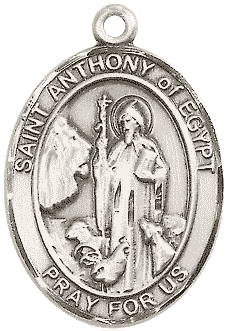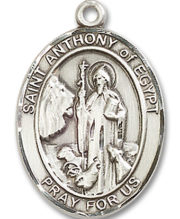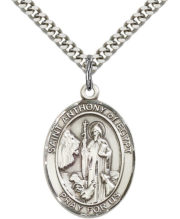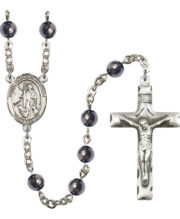Saints
St. Anthony of Egypt Medal
St. Anthony of Egypt Biography
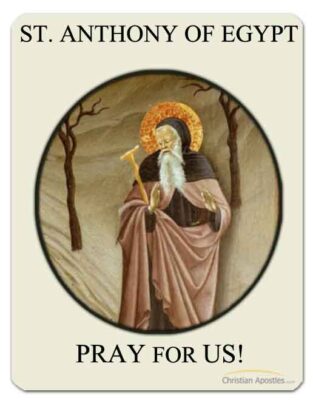 St. Anthony of Egypt, the Patron Saint of Monks, was born of wealthy Christian parents at Coma, a small village in Upper Egypt, in 251. Before he was twenty years of age his parents died and he found himself the possessor of a large estate and charged with the care of a younger sister.
St. Anthony of Egypt, the Patron Saint of Monks, was born of wealthy Christian parents at Coma, a small village in Upper Egypt, in 251. Before he was twenty years of age his parents died and he found himself the possessor of a large estate and charged with the care of a younger sister.
St. Anthony of Egypt, also known as Anthony the Great or Anthony the Abbot, was an early Christian monk and hermit who lived in the 4th century. He is considered one of the most prominent and influential figures in the development of Christian monasticism.
Anthony was born in 251 AD in Lower Egypt, near present-day Cairo, to a wealthy Christian family. He was well-educated and fluent in both Greek and Coptic. When he was 20 years old, Anthony’s parents died, leaving him a significant inheritance. He distributed his wealth to the poor, and then decided to pursue a life of religious devotion and solitude.
In the year 270, Anthony left his home and moved into the desert, seeking to live a life of isolation and asceticism. He settled in a tomb near the Red Sea and began to live as a hermit. He spent his days fasting, praying, and studying scripture. He also spent time with other hermits who came to visit him. He became known for his wisdom and spiritual guidance, and many sought him out for advice.
As his reputation grew, more and more people came to join him in the desert, seeking to live the ascetic life. Anthony began to attract a group of followers and established a monastic community in the desert. He established guidelines and rules for the community, and soon, many other monastic communities formed in the Egyptian desert, following Anthony’s example.
Anthony’s monastic rule was very strict, requiring long periods of fasting, manual labor and continuous prayer. He also taught that the Devil will always challenge and tempt the hermits, so they needed to be always vigilant and to pray for strength. He had a great influence on how monasticism became a central practice in Christianity, spreading the concept of a solitary contemplative life to the Western world.
For more than 40 years, Anthony lived in the desert and gained a reputation as a spiritual leader, healer, and wonder-worker. He wrote several influential texts on the ascetic life, including a treatise on the nature of the demons, which provided insight into the spiritual warfare aspect of asceticism. His teachings were considered valuable both for the religious life and for the spiritual development of all Christians.
Anthony lived to be 105 years old, and passed away in 356 AD. He was immediately venerated as a Saint by the local population, and many people believed that he had performed miracles during his life. Today, he is venerated as a Saint by the Eastern Orthodox Church, the Coptic Orthodox Church, the Catholic Church, and the Anglican Communion.
St. Anthony of Egypt is considered the father of Christian monasticism, his teachings and practices were spread throughout the Christian world and influenced many monks, hermits, and mystics in the centuries that followed. His writings continue to be read and studied by those interested in the ascetic and monastic life, and his legacy lives on in the many monastic orders that continue to exist in the Christian church today.
St. Anthony of Egypt Acts on God’s Word
About six months later he read in church the words of Christ to the rich young man: “”Go sell what thou hast, and give to the poor: and come, follow Me’. (Matthew 19-21)Anthony considered these words as addressed to him and gave away all of his possessions. Placing his sister in a convent, he retired into solitude near Coma and begged an aged hermit to teach him the spiritual life. He visited other solitaries and strove to emulate the principal virtue of each, so that he soon became a perfect model of humility, Christian courtesy, charity, prayer, and all the other virtues.
Establishing the First Religious Community
About the year 305, when Anthony was fifty-five, he left his mountain retreat and founded his first monastery at Fayum, and another shortly after at Pispir. By gathering together a number of hermits into one community, St. Anthony was the first to establish the religious life as it is known today. He became famous throughout Egypt and even beyond its borders, so that people from all walks of life sought his advice
In 339 St. Anthony saw in a vision, under the figure of “mules kicking down the altar”, the havoc which the Arian persecution was to make two years later in Alexandria, and clearly foretold it, as St. Athanasius, St. Jerome and St. John Chrysostom assure us. St. Anthony aided St. Athanasius in his fight against the heretical teachings of Arianism. When ninety years old he preached a sermon in Alexandria at the invitation of St. Athanasius, in which he boldly accused the Arians of heresy. A most sublime gift of heavenly contemplation and prayer was the fruit of this great saints holy retirement.
On January 17, 356, at the age of one hundred and five, St. Anthony died peacefully in the Lord.
St. Anthony of Egypt’s Lasting Impact
By establishing the first religion community, St. Anthony of Egypt set a model that continues to this day of an ideal community for growing closer to God. By wearing a St Anthony of Egypt necklace each day we are reminded of the important role we are each called in building God’s Kingdom here on earth.
This St Anthony of Egypt medal is a great way to honor the work and prayer of the beautiful men and women who still to this day follow the example of St Anthony and have dedicated their lives in prayer and devotion to God. May we each be inspired to answer God’s calling in our own lives. St. Anthony of Egypt, patron saint of months, pray for us.
Prayers to St. Anthony of Egypt
Prayer for Saint Anthony of Egypt’s Intercession
O’ Glorious Saint Antony, who upon hearing only one word of the Gospel didst forsake the riches and the ease of thy family, thy native land and the world, in order to retire into the wilderness; who, in spite of thy heavy burden of advanced age and the ravages of severe penance, didst not hesitate to leave thy solitude to rebuke openly the impiety of heretics and to restore wavering Christians to a firmer hold upon their faith with all the zeal of a confessor desirous of martyrdom;
who through thy conquest of self and the excellence of thy virtues was endowed by Our Lord with miraculous power over animate and inanimate nature; do thou obtain for us the grace to be ever zealous in the cause of Christ and His Church and to persevere even unto death in our imitation of thee, in our belief in revealed truth, and in our keeping of they commandments and the counsels of the Gospel; to the end that, having faithfully followed in thy footsteps here on earth, we many be enabled to become sharers in thy heavenly glory through all the ages of eternity. Amen.
Prayer as you put on your St. Anthony Medal
O Christ our God, You taught us the way of true perfection and happiness. You encouraged those who follow You to sell what they have, give to the poor and to take up the cross. When blessed Anthony heard these words, his heart was inflamed with love for You. He left the world, renounced nation and family and accepted Your easy yoke. He entered monastic life with his companions: mortification, abstinence and self-denial. By turning away from everything, he turned to You alone; and by dying to himself, he lived for You alone. For this reason we honor his memory and say: Blessed are you, holy Anthony, father of monks and example of religious life; tall cedar on the slope of Mount Lebanon, you have become a prophetic word echoing in the world .Blessed are you, holy Anthony; you became a lampstand for the Light of the world. By that Light, many have been guided in the way of religious life Blessed are you, Holy Anthony, morning star in a world of darkness. Your light made evil fear and caused sin to drawback in fright. How glorious is your Lord, now and forever.
Prayer to St. Anthony of Egypt for Inspiration
God our Father,
You gave St Anthony of Egypt
the courage and belief of an apostle
to give up his wealth,
living a life of poverty and solitude,
and to found monasteries.
Help us to be zealous in imitating his virtues
and to follow in the footsteps of Our Lord Jesus Christ.
Grant this through the same Christ Our Lord
who lives and reigns with You and the Holy Spirit,
one God, for ever and ever.
Amen.
Popular St. Anthony of Egypt Items
A St. Anthony medal or a St. Anthony rosary is a perfect gift to give to a young man who has chosen St. Anthony as their confirmation name. As the patron saint of farmers and butchers, wearing a St. Anthony Abbott medal daily is a perpetual prayer for St. Anthony to intercede on behalf of the wearer. As saints are united closer to God, their prayers are more efficacious, and enriches your own prayer.
Additionally, a Saint Anthony pendant is a reminder to emulate the example of the holy saint in your daily life. What a beautiful testament of faith to share with the world, or to keep discretely tucked under your clothes. During the challenging moments of your day, reflect upon the holy life of St. Anthony and pray for their intercession and protection.
St. Anthony of Egyptis the patron saint of Monasticism
St. Anthony of Egypt is a Saint of the Catholic Church and also known as the “Father of Monasticism.” He was a Christian monk who lived in the 4th century and is known for his deep devotion to God and his hermitic lifestyle in the desert. He is said to have received many revelations and visions from God, and his teachings and writings had a profound influence on the early Christian Church.
Reflection on the feast day of St. Anthony of Egypt
The feast day of St. Anthony of Egypt is January 17th.
St. Anthony of Egypt is known as the “”Father of Monasticism”” and is remembered for his deep devotion to God and his dedication to the monastic way of life. He lived in the 3rd and 4th century AD and is considered to be one of the most influential figures in the development of Christian monasticism.
One of the main lessons we can learn from St. Anthony of Egypt is the importance of devotion to God. Anthony was deeply devout from a young age, and his faith was the driving force behind all of his actions. He was known for spending hours in prayer and for his deep love for the Eucharist. This devotion to God is something that we can all strive for in our own lives, regardless of our religious affiliation.
Another important lesson from St. Anthony of Egypt is the value of solitude and self-reflection. Anthony lived a life of solitude in the desert, where he spent time in prayer, fasting and contemplation. This life of solitude and self-reflection helped him to deepen his relationship with God and gain a greater understanding of himself and his own spiritual journey. In today’s fast-paced world, it can be difficult to find time for solitude and self-reflection, but it is important to make the effort to find moments of quiet and reflection in our daily lives.
A third lesson from St. Anthony of Egypt is the power of community. Anthony was not only a solitary figure but also a leader of the monastic community. He was known for his wisdom and compassion and his ability to guide others on their spiritual journey. He also was a model of humility and generosity, always encouraging his followers to put the needs of others before their own. Today, we can strive to build strong communities and to be good leaders by following his example.
A fourth lesson from St. Anthony of Egypt is the importance of simplicity. Anthony lived a simple life, with few possessions and simple needs. He taught that material possessions could get in the way of spiritual growth and that simplicity in material things helped to foster spiritual growth. In today’s consumer-driven society, it can be difficult to resist the pull of materialism. But by following Anthony’s example, we can learn to value simplicity and to seek fulfillment in spiritual rather than material things.
Finally, St. Anthony of Egypt reminds us of the importance of perseverance in our spiritual journey. Anthony faced many challenges and temptations during his life, but he persevered and remained committed to his spiritual path. Today, we can take inspiration from his example and strive to persevere in our own spiritual journeys, even when things get tough.
Discover biographies, prayers, and reflections for more than 400 Catholic Saints
Saints Similar to St. Anthony of Egypt
You may also be interested in reading the Biography of St. Anthony of Padua. St. Anthony of Egypt and St. Anthony of Padua share the name “Anthony” and are both renowned as powerful intercessors. St. Anthony of Egypt is an early Christian desert father and hermit, known for his asceticism and spiritual wisdom. St. Anthony of Padua, on the other hand, is celebrated for his eloquence and is often invoked to find lost items. Next up: Biography of St. Anthony of Padua
Also check out our handmade St. Anthony of Egypt Medal and St. Anthony of Egypt Rosary and St. Anthony of Egypt Rosary Bracelet.

